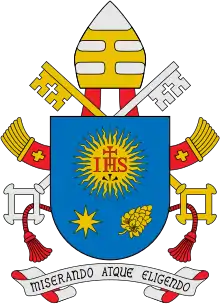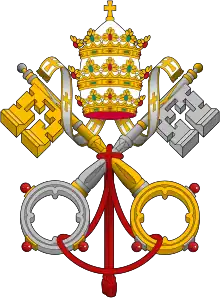| Spiritus Domini Latin for 'The Spirit of the Lord' Apostolic letter of Pope Francis | |
|---|---|
 | |
| Signature date | 10 January 2021 |
| Subject | Change to canon 230 §1 of the 1983 Code of Canon Law to allow women to be instituted as acolytes and lectors |
| Text | |
| AAS | 113 (2): 169-170 |
Spiritus Domini is an apostolic letter in the form of a motu proprio by Pope Francis signed on 10 January 2021 and released the next day. It changed the 1983 Code of Canon Law to allow women to be admitted to the instituted ministries of acolyte and lector (reader), which had until then been exclusively available to men.
Background
Since the Second Vatican Council, the bishops of the Catholic Church have permitted women to serve in many lay ministries.[1] While the offices of lector (reader) and acolyte were previously minor orders, with Ministeria quaedam, Pope Paul VI abolished these and the subdiaconate, creating "instituted ministries" in their stead.[2] Paul VI wrote in Ministeria quaedam that "[i]n accordance with the ancient tradition of the Church, institution to the ministries of reader and acolyte is reserved to men."[3][4] The two instituted ministries of lector and acolyte were restricted to men, and in many dioceses, reserved to those preparing for the priesthood in seminaries. In other dioceses, they were conferred on lay men who had been serving in these roles.[5][6]
With the 1983 Code of Canon Law, the situation changed: men and women could take those roles, but women could only take them temporarily (i.e. women could not be instituted).[7] In 1994, the Congregation for Divine Worship and the Discipline of the Sacraments under Pope John Paul II clarified that the §2 of the canon 230 of the 1983 Code of Canon Law said that it was also licit for women and girls to be altar servers just as men and boys already were, but that those women and girls were not to get the benefit of their position being instituted ministries.[1][7] "In most dioceses around the world — and at the Vatican as well — women and girls have been lectors at Mass and have served at the altar for decades. That service was possible, not as a formally instituted ministry, but under the terms of Canon 230, paragraph 2, which allowed for women or men to carry out the functions 'by temporary designation'".[8]
Change
The motu proprio was signed on 10 January 2021 (the feast of the Baptism of the Lord),[9] and released on 11 January 2021; it changes the 1983 Code of Canon Law (canon 230 §1) to state that the instituted ministries of acolyte and lector are open to "lay persons", i.e. both men and women, instead of previously "lay men". This change, Francis says, acknowledges a "doctrinal development" that has occurred in recent years.[10][2][8]
Canon 230 §1 of the Code of Canon Law reads with this change: "Lay persons of suitable age and with the gifts determined by decree of the Episcopal Conference may be permanently assigned, by means of the established liturgical rite, to the ministries of lectors and acolytes". Previously, it read: "Lay men who possess the age and qualifications established by decree of the conference of bishops can be admitted on a stable basis through the prescribed liturgical rite to the ministries of lector and acolyte".[2]
Pope Francis also wrote a letter to cardinal Luis Ladaria, prefect of the Congregation for the Doctrine of the Faith, to explain his decision. In it, Francis says the Amazon synod marked the necessity to think about "new paths for ecclesial ministeriality," not only for the Amazonian Church, but for the whole Catholic Church in variety of situations.[11][12] He also states concerning John Paul II's affirmation of the inability of the Catholic Church to ordain women: "for non-ordained ministries it is possible, and today appears opportune, to go beyond that reservation."[8][12]
Reactions
Peter M.J. Stravinskas, a priest and writer of the Catholic World Report, criticized the document, saying that it would spread confusion among the faithful and contradicted prior Catholic teachings of Christifideles laici and the Instruction on Certain Questions Regarding the Collaboration of the Non-Ordained Faithful in the Sacred Ministry of the Priest.[13]
According to Thomas O'Loughlin, the document is "a very interesting small brick in his larger pastoral edifice dedicated to implementing the reforms mandated over half a century ago by the Second Vatican Council"; he adds that this motu proprio has made canon law "catch up to the [current] theology".[14]
Aftermath
On 23 January 2022, Pope Francis installed for the first time women as instituted lectors and catechists. On this day, Pope Francis held a ceremony during which he installed six women as institutional lectors, and three women as institutional catechists, along with some men.[15][16][17]
See also
- Antiquum ministerium
- Priesthood of all believers
References
- 1 2 "Female Altar Servers | EWTN". EWTN Global Catholic Television Network. Retrieved 2021-01-11.
- 1 2 3 Mares, Courtney (January 11, 2021). "Pope Francis admits women to ministries of lector and acolyte in new motu proprio". Catholic News Agency. Retrieved 2021-01-11.
- ↑ Deacon Pedro (18 January 2021). "Deacon-structing Lectors and Acolytes". Salt + Light Media. Retrieved 2021-02-02.
- ↑ "Ministeria Quaedam | EWTN". EWTN Global Catholic Television Network. Retrieved 2021-02-02.
- ↑ "Ministries of Lector and Acolyte | EWTN". EWTN Global Catholic Television Network. Retrieved 2021-01-11.
- ↑ "Chapter III: Duties and Ministries in the Mass | USCCB". www.usccb.org. Retrieved 2021-01-11.
- 1 2 "Explainer: The history of women lectors and altar servers—and what Pope Francis has changed". America Magazine. 2021-01-11. Retrieved 2021-02-02.
- 1 2 3 Wooden, Cindy (2021-01-11). "UPDATE: Pope amends canon law so women can be installed as lectors, acolytes". Catholic News Service. Archived from the original on January 11, 2021. Retrieved 2021-01-12.
- ↑ "Apostolic Letter in the form of Motu Proprio Spiritus Domini, modifying Canon 230 §1 of the Code of Canon Law regarding access of women to the ministries of Lector and Acolyte (10 January 2021) | Francis". www.vatican.va. Retrieved 2021-02-02.
- ↑ "Pope Francis: Ministries of lector and acolyte to be open to women". Vatican News. 2021-01-11. Retrieved 2021-01-11.
- ↑ Mares, Courtney (2021-01-11). "Pope Francis admits women to ministries of lector and acolyte in new motu proprio". Catholic News Agency. Retrieved 2021-01-11.
- 1 2 "Letter of the Holy Father Francis to the Prefect of the Congregation for the Doctrine of the Faith on access of women to the ministries of Lector and Acolyte". press.vatican.va. Retrieved 2021-01-11.
- ↑ Stravinskas, Peter M.J. (11 January 2021). "Confusion twice confounded: On the motu proprio Spiritus Domini". The Catholic World Report. Retrieved 11 January 2021.
- ↑ O'Loughlin, Thomas (2021-01-19). "The larger dimension of the pope's new document on women and ministry". international.la-croix.com. Retrieved 2021-01-21.
- ↑ Wooden, Cindy (2022-01-23). "Pope confers ministries of lector, catechist on lay women and men". Catholic News Service. Archived from the original on January 23, 2022. Retrieved 2022-01-24.
- ↑ Pullella, Philip (23 January 2022). "Pope confers lay ministries on women, formalising recognition of roles". Reuters.
- ↑ San Martín, Inés (23 January 2022). "For first time, Pope Francis installs women in two church ministries". Crux. Retrieved 2022-01-24.

